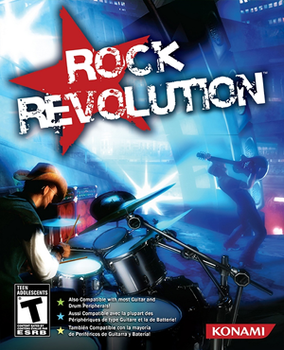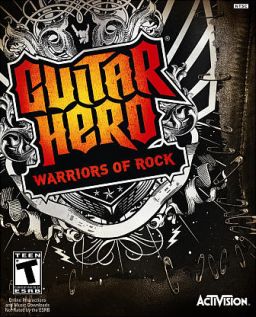Dance Dance Revolution (DDR) is a music video game series produced by Konami. Introduced in Japan in 1998 as part of the Bemani series, and released in North America and Europe in 1999, Dance Dance Revolution is the pioneering series of the rhythm and dance genre in video games. Players stand on a "dance platform" or stage and hit colored arrows laid out in a cross with their feet to musical and visual cues. Players are judged by how well they time their dance to the patterns presented to them and are allowed to choose more music to play to if they receive a passing score.

A game controller, gaming controller, or simply controller, is an input device or input/output device used with video games or entertainment systems to provide input to a video game. Input devices that have been classified as game controllers include keyboards, mouses, gamepads, and joysticks, as well as special purpose devices, such as steering wheels for driving games and light guns for shooting games. Controllers designs have evolved to include directional pads, multiple buttons, analog sticks, joysticks, motion detection, touch screens and a plethora of other features.

StepMania is a cross-platform rhythm video game and engine. It was originally developed as a clone of Konami's arcade game series Dance Dance Revolution, and has since evolved into an extensible rhythm game engine capable of supporting a variety of rhythm-based game types. Released under the MIT License, StepMania is open-source free software.
Bemani, stylized as BEMANI, is Konami's music video game division. Originally named the Games & Music Division (G.M.D.), it changed its name in honor of its first and most successful game, Beatmania, and expanded into other music-based games, most notably rhythm games such as Dance Dance Revolution, GuitarFreaks, and DrumMania.

Gitadora is a music video game series produced by Konami. The series consists of two games, GuitarFreaks and DrumMania, where players use game controllers modeled after musical instruments to perform the lead guitar, bass guitar and drums of numerous songs across a wide range of genres by matching scrolling musical notes patterns shown on screen. Players are scored for successfully-hit notes, but may fail a song if they miss too many notes. The series has featured numerous game modes, and supports both single-player and multiplayer modes where up to three players can perform together. Some earlier versions of the game could also be linked with Keyboardmania.

In the Groove is a rhythm game developed & published by Roxor Games, and is the first game in the In the Groove series. The game was shown in an official beta-testing preview on July 9, 2004, and was officially released in arcades around August 30, 2004. A PlayStation 2 port of In the Groove was released on June 17, 2005, by RedOctane.

Rhythm game or rhythm action is a genre of music-themed action video game that challenges a player's sense of rhythm. Games in the genre typically focus on dance or the simulated performance of musical instruments, and require players to press buttons in a sequence dictated on the screen. Many rhythm games include multiplayer modes in which players compete for the highest score or cooperate as a simulated musical ensemble. Rhythm games often feature novel game controllers shaped like musical instruments such as guitars and drums to match notes while playing songs. Certain dance-based games require the player to physically dance on a mat, with pressure-sensitive pads acting as the input device.

Guitar Hero is a 2005 music rhythm video game developed by Harmonix and published by RedOctane for the PlayStation 2. It is the first main installment in the Guitar Hero series. Guitar Hero was released in November 2005 in North America, April 2006 in Europe and June 2006 in Australia. The game's development was a result of collaboration between RedOctane and Harmonix to bring a Guitar Freaks-like game to United States.
Guitar Hero is a series of music rhythm game video games first released in 2005, in which players use a guitar-shaped game controller to simulate playing primarily lead, bass guitar, and rhythm guitar across numerous songs. Players match notes that scroll on-screen to colored fret buttons on the controller, strumming the controller in time to the music in order to score points, and keep the virtual audience excited. The games attempt to mimic many features of playing a real guitar, including the use of fast-fingering hammer-ons and pull-offs and the use of the whammy bar to alter the pitch of notes. Most games support single player modes, typically a Career mode to play through all the songs in the game, as well as competitive and cooperative multiplayer modes. With the introduction of Guitar Hero World Tour in 2008, the game includes support for a four-player band including vocals and drums. The series initially used mostly cover versions of songs created by WaveGroup Sound, but most recent titles feature soundtracks that are fully master recordings, and in some cases, special re-recordings, of the songs. Later titles in the series feature support for downloadable content in the form of new songs.

Rock Band is a music video game developed by Harmonix, published by MTV Games and distributed by Electronic Arts. It is the first title in the Rock Band series. The Xbox 360 and PlayStation 3 versions were released in North America on November 20, 2007, while the PlayStation 2 version was released on December 18, 2007 and the Wii version on June 22, 2008. Harmonix previously developed the first two games in the Guitar Hero series, which popularized gameplay of rock music with guitar-shaped controllers. After development of the series was shifted to Neversoft, Harmonix conceived Rock Band as a new title that would offer multi-instrument gameplay.

Guitar Hero World Tour is a 2008 music rhythm video game developed by Neversoft and published by Activision. It is the fourth main installment in the Guitar Hero series. The game was launched in North America in October 2008 for the PlayStation 2, PlayStation 3, Wii, and Xbox 360 consoles, and a month later for Europe and Australia. A version of World Tour for Microsoft Windows and Mac OS X was later released by Aspyr.

Rock Revolution is a music video game developed by Zoë Mode and HB Studios and published by Konami. The game was released on 15 October 2008 for the Nintendo DS, PlayStation 3, Wii and Xbox 360. As with similar titles, the game uses various controllers to simulate the performance of rock music, primarily using guitar and drum controllers on its Xbox 360 and PlayStation 3 versions.

Rock Band 2 is a 2008 music video game developed by Harmonix, published by MTV Games and distributed by Electronic Arts. It is the sequel to Rock Band and is the second title in the series. The game allows up to four players to simulate the performance of popular songs by playing with controllers modeled after musical instruments. Players can play the lead guitar, bass guitar, and drums parts to songs with "instrument controllers", as well as sing through a USB microphone. Players are scored on their ability to match scrolling musical "notes" while playing instruments, or by their ability to match the singer's pitch on vocals.

Guitar Hero: Metallica is a 2009 music rhythm video game developed by Neversoft and published by Activision. The game was released in North America on the PlayStation 3, Wii, and Xbox 360 on March 29, 2009, and on PlayStation 2 on April 14, 2009, with an Australian and European release in May 2009. It is the second game in the Guitar Hero series to focus on the career and songs of heavy metal band, Metallica, following Guitar Hero: Aerosmith.

Rock Band is a series of rhythm games developed by Harmonix, principally for home video game consoles. Based on their previous development work from the Guitar Hero series, the main Rock Band games has players use game controllers modeled after musical instruments and microphones to perform the lead guitar, bass guitar, keyboard, drums and vocal parts of numerous licensed songs across a wide range of genres though mostly focusing on rock music by matching scrolling musical notes patterns shown on screen. Certain games support the use of "Pro" instruments that require special controllers that more closely mimic the playing of real instruments, providing a higher challenge to players. Players score points for hitting notes successfully, but may fail a song if they miss too many notes. The series has featured numerous game modes, and supports both local and online multiplayer modes where up to four players in most modes can perform together.

Guitar Hero is a series of rhythm video games published by Activision in which players use guitar-shaped controllers to mimic the playing of numerous rock music songs in a score attack gameplay; later games in the series have included support for drums and vocals and playing as a full band. With over $2 billion in total sales worldwide, the game series has made a significant cultural impact, becoming a cultural phenomenon and recognizable in the popular culture. The series has been found to influence younger players into learning real instruments and has found application within the health care industry to help recovering patients.

Power Gig: Rise of the SixString is a rhythm game developed and published by Seven45 Studios, a subsidiary of musical instrument manufacturer First Act. Unveiled at the 2010 Game Developers Conference, it was released for PlayStation 3 and Xbox 360 on October 19, 2010.

Guitar Hero: Warriors of Rock is a 2010 music rhythm video game developed by Neversoft and published by Activision. The sixth main installment in the Guitar Hero series following Guitar Hero 5. The game was released in September 2010 for PlayStation 3, Wii, and Xbox 360. Similar to previous entries in the franchise, it is geared towards playing in a four-person band experience, including lead and bass guitar, drums, and vocals. The game is available as a standalone title, allowing players to use existing compatible instrument controllers, and as a bundle that provides these controllers.
Rhythm game accessories are often required to play rhythm games available for various consoles, such as the PlayStation 2, PlayStation 3, Wii, and Xbox 360. These include dance pads, guitar controllers, drum controllers, microphones and turntable controllers. With the exception of microphones, these controllers can generally be used to control any game, but have limited inputs, making them impractical for most games.

StepManiaX is a rhythm game developed and published by Step Revolution, a studio formed by former developers of In the Groove, ReRave, and Pump It Up Pro. It is considered a spiritual successor to the In the Groove series. The name is a nod to the legacy of the open-source simulator StepMania, as many of the original StepMania developers were involved with the project. StepManiaX is derived from the same codebase, with modifications made to support the new game types, lights, touch support, connectivity, and the custom Android operating system and hardware that dedicated units run on.














